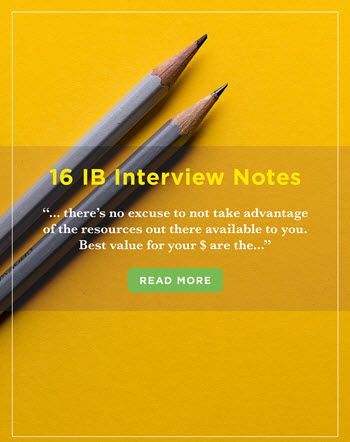21 Finance Interview Questions and Answers

You're just starting the finance recruiting season. You're an undergrad that needs to ace his or her finance job interview. Or you're aMBAstudent that needs to land that top-notch offer. Most importantly, you're in luck! We've compiled a list of the most common and frequently asked finance interview questions.
If you want to ace your finance interview then make sure you review and perfect the answers to the below questions. This guide is based on real questions asked at banks, and is curated from Wall Street Oasis (WSO) global community with over 500,000 members that have been in your shoes.
In addition to this comprehensive guide to finance interview Q&A, you might also want to arm yourself with the complete2018世界杯狗万滚球app and do some1Manbetx . Check out the full list of awesomeInterview & Recruiting Prep CoursesfromWSOfor more information.
But if you're looking for just the basic fresher on Finance Interview questions, look no further!
Behavioral or Fit Questions at Finance Interviews
You'll first face behavioral/fit questions. These involve resume walkthroughs, "Why this industry?" or "Why this firm?" questions, and "Tell me a time…" questions. Here's how to crack those.
Background or Resume Walkthrough
Prepare a 90 second resume walkthrough that focuses on the positive motivating factors behind every transition (school to job, job to better job, most recent job to grad school). For example, "I went to school to design, but after one internship I realized I liked interacting with clients directly and pursued full-time roles with a sales role. In that role, I developed A and B. I wanted to continue honing those and branch out to focus on C. So, I sought a new role at Morgan Sachs..."
"Why this" Questions
Why do you want to do finance or investment banking? Why this firm? Why are you a good fit? Research the firm beforehand - what their "About Page" focuses on, what values and principles they abide by. Tailor these answers for each firm or industry and practice them.
"Tell me About a Time When…"
这些是他们问的问题当他们想know about your leadership, or dealing with a difficult client, or persuading someone, etc. Here the trick is to answer the right question. For every question, map out the story using the SOAR framework. Describe the Situation (10-15 seconds), Obstacle (10-15s), Action (60-75s), and Result (15-30s). Stories for these questions should be 1.5-2 minutes long and focus only on what's important.
Basic Technical Finance Interview Questions and Answers
These are the basic finance questions asked to start off most technical interviews. Questions may progress to the next section (Advanced), depending on age and experience.
What are four financial statements?
- Income statement (rev-cogs-exp = Net Income)
- Balance Sheet (Assets= Liabilities + Shareholder's equity)
- Statement of Cash Flows (Beginning Cash + CF from Operations + Cash Flow from investing + CF from financing = ending cash)
- Statement of Stockholders' Equity
How are the three main financial statements connected?
- Net income flows from Income Statement into the Cash Flow from Operations on the CF statement
- Net income - dividends is added to retained earnings from the prior period's Balance Sheet to come up with retained earnings on this period's Balance Sheet
- Beginning Cash on the CF Statement is cash from the prior period's Balance Sheet and Ending Cash on the CF statement is Cash on the current period's Balance Sheet
A more comprehensive summary chart:

Walk me through the Income Statement?
The first line of the Income Statement represents revenues or sales. From that we subtract the cost of goods sold, which gives gross margin. Subtracting operating expenses from gross margin gives us operating income (EBIT). We then (add/subtract) interest expense (income), taxes, and other expenses (income) to arrive at Net Income.
If you could choose only one statement to evaluate the financial state of a company, which would you choose?
The cash flow statement because it shows the actual liquidity of the company and how much cash it is generating and using. The balance sheet just shows a snapshot of the company at one time, without showing the performance of the company, and the Income statement has a number of non-cash expenses that may not actually be affecting the company's health. But the key to a great company is generating significant cash flow and also having a healthy cash balance and this will show on the CF statement.
What isEBITDA?
Earnings before Interest, Depreciation, Taxes and Amortization.EBITDAgives a good idea of a company's profitability and is a quick metric for free cash flow because it will allow you to determine how much cash is available from operations to pay interest, capex, etc.EBITDA= Rev-Exp. It can be used in rough valuation as a metric, such asEV/EBITDA.
What is Enterprise Value?
Enterprise Value is the value of an entire firm, both debt and equity. This is the price that would be paid for the company in the event of an acquisition without a premium.EV= Market Value of Equity + Debt + Preferred Stock + minority interest - Cash
Can a company have a negative book equity value?
Yes. If there are large cash dividends or if the company has been operating at a loss for a long time.
What are the ways you can value a company?
- Comparable Companies/Multiples Analysis
- Market Cap/Market Valuation
- precedent transactions
- Discounted Cash Flow (DCF)
- Leveraged Buyout Model (LBO)
- Liquidation Valuation
When does aLBO事务occur?
Used when firm uses higher than normal amount of debt to finance purchase of a company, then uses company's cash flows to pay off debt over time. The acquisiton's assets may be used as collateral. Ideally, the acquisitions debt has been partially retired at time of exit.
Walk me through a DCF?

Find and predict FCFs during modeling period.
- Free cash flows = EBIT (1-t) + D&A - Capex - Change in NWC
- Predict cash flows beyond the term projected. This requires terminal value (terminal growth Multiple, Perpetuity Method, Growth Rate)
- Once future cash flows have been projected then find PV of CFs at theWACC.
- The final cash flow in year N will be equal to the sum of the terminal value calculation and the final year'sFCF.
What isWACCand how do you calculate it?
Weighted Average Cost of Capital. It reflects the cost of the company raising new capital and reflects the riskiness of a company.
Why do you project outFCFfor theDCFmodel?
The reason we project out free cash flows for theDCFis because theFCFis the amount of actual cash that could be hypothetically be paid out to debt and equity holders from a company.
What isCAPM?
Used to Calculate the required/expected return on equity. Return on Equity = Risk free rate + Beta(Market Return - Risk Free Rate)
What is Beta?
Beta is a measure of the volatility of an investment compared with the market as a whole. The market has a beta of 1, while investments that are more volatile than the market have a beta greater than 1 and those that are less volatile have a beta less than 1.
Advanced /MBA瞿财务面试estions and Answers
These are questions that are also asked for junior-year Summer Analyst, full-time Analyst, andMBAjob interviews. These advanced finance questions require deeper thinking and understanding of corporate finance.
How does a ten dollar increase in depreciation expense affect each of the three financial statements? Assume taxes are .4
- Start with Income Statement (decreases NI by 10 and increases by tax shield (10*(1-t)) =4) so net income decreases by 6.
- 然后去现金流。因为不t income drops by 6 flows from operations reduce by 6, but we have to add back dep since it is non cash so +10. This equals an increase by 4.
- Then go to balance sheet (Cash =+4, PP&E down by 10, Assets fall by 6, retained earnings fall by 6)
Why would a company issue equity rather than debt to fund its operations?
- If the company feels its stock price is inflated they can raise a large amount of capital compared to percentage of ownership sold
- If the projects the company plans to invest in with proceeds may not produce immediate or consistent cash flows to pay debt
- If the company wants to adjust cap structure or pay down debt
- If the owners of the company want to sell off a portion of their ownership
How/Why do you lever or unlever beta?
By unlevering beta you remove the financial effects of debt in the capital structure. This will show you the risk of a firm's equity compared to the market. Also when you have a company that is not on the market and doesn't have a beta, you can take a company on the market that is similar and unlever its beta as a proxy for the unlisted company's beta.
What is the difference between cash-base accounting and accrual?
Cash based accounting recognizes sales and expenses when cash actually flows out of the company. Accrual based accounting recognizes revenues and expenses as they are incurred regardless of whether cash flows out of the company at that exact time. Accrual based accounting is the more popular method.
How is it possible for a company to have positive net income but go bankrupt?
If working capital erodes (such as increasing accounts receivable, lowering accounts payable), it is possible. Also, financial fraud can also be a possibility.
What are the major factors that drive mergers and acquisitions?
- To achieve synergies (cost savings)
- Diversify or sharpen the focus, market, or products of the company
- Gain new technologies
- Eliminate a competitor from the market or grow market share
- Increase Supply-Chain Pricing Power by buying a supplier or distributor
- Improve financial metrics and numbers
If you were Chief Financial Officer (CFO) of a Fortune 500 company, what would be your concerns? Explain from a high-level what the long-term financial implications are for your company.
- Highlight different things on each of the three statements:
- Income statement: revenue growth, cost and margins, profits
- Balance sheet: liquidity ratios, capital assets, credit ratings
- Cash flow statement: cash flows in short and long-terms, raising money
Acing the Finance Interview
It's all about practice, practice, and practice! Make sure your behavioral stories are planned out, and practiced (but don't sound too rehearsed!). Practice answering finance technical questions on the fly, perhaps some1Manbetx 真正让自己的区域。
Common Finance Interview Questions
At the very least, review the most common finance questions and answers above at least a few times before your first interview. Nowadays, however, that really isn't enough to set yourself apart from the competition. If you want to see the complete set of finance interview questions (over 7,000 to be exact), cases, videos, templates, tricks, and answers - take a look at the complete2018世界杯狗万滚球app too!
Remember, at the end of the day - it'll be you, your preparation, and your confidence that will win you the interview. Set yourself up to acing the interview and landing that dream offer! Good luck!
Graphics Disclosure:Background vector created by Brgfx - Freepik.com //Designs by Freepik //Icons made byFreepikfromwww.flaticon.comis licensed byCC 3.0 BY// Edited by Ajay Patel







Comments (3)
Thanks! This is really helpful!
Sorry to bring up an old thread.. For a first round interview, how much of the advanced questions should I expect? Interview should be around half an hour so I'm not expecting a ton of drilling, but I want to be prepared
Array
Repellendus sed inventore aut qui consequatur. Beatae facere ut harum reprehenderit quo architecto. Laborum omnis beatae temporibus sit cum illum ut dolor. Et nulla vero ut ut. Repellendus sit eveniet omnis aperiam inventore ad vero.
Sint voluptas suscipit adipisci laborum aut odit. Neque vel vero sint qui sapiente repellat et ut. Deleniti eum in architecto reiciendis quo.
Aliquid debitis incidunt officiis illum veniam quam veritatis illum. Quibusdam minima vero assumenda rerum consequuntur consequatur expedita suscipit. Culpa neque illum omnis aut et beatae. Eum dicta omnis et sequi. Nulla perspiciatis quibusdam odio ducimus quibusdam impedit.
See All Comments - 100% Free
WSO depends on everyone being able to pitch in when they know something. Unlock with your email and get bonus:6 financial modeling lessons free($199 value)
orWant toUnlockby signing in with your social account?
Preview & download comment as image
You can download this screenshot as image or copy to clipboard using browser's context menu